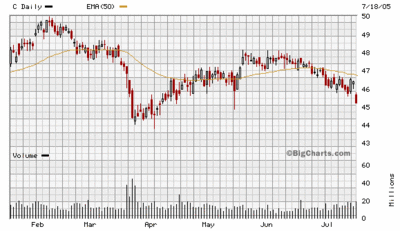
When short-term rates are high relative to long-term rates, bank margins get squeezed. Since they are in the business of borrowing "short" and lending "long", when their cost of funds rises (short rates), while the price they charge others to borrow them remains the same (long rates), their profits dissappear.
The yield curve itself is a product of both the market, and government intervention. The Fed has been hiking up short rates in order to keep inflation at bay, and to keep speculative markets like real estate, from getting out of hand. But longer-term rates like the ten year T-bond yield, are set by the market, and have remained stubbornly low.
If short rates continue to rise and surpass long rates, the yield curve will then be negative, and that does not bode well for the economy or the stock market. Financing begins to dry up as lending money becomes unprofitable, and business activity slows down as a result.
And even a well diversified banking powerhouse like Citigroup will feel the pain of an unacknowledged business cycle.
No comments:
Post a Comment